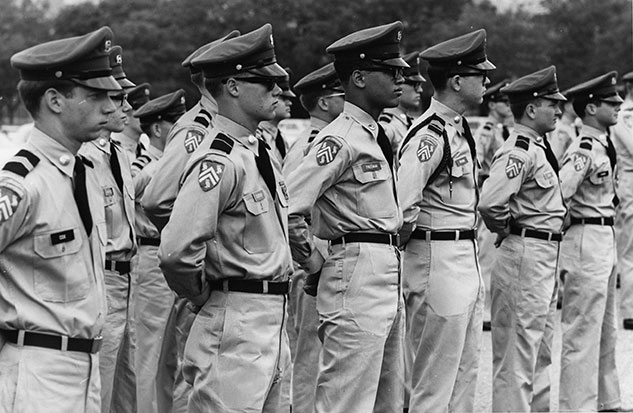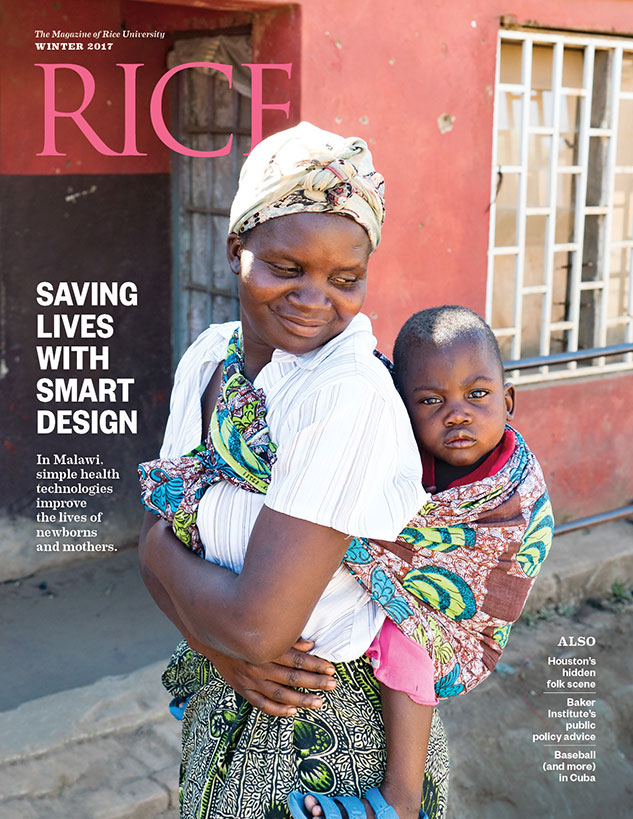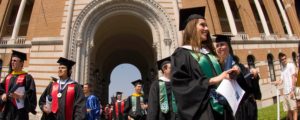Gifted and Black: Charles Freeman III
In the first two years after desegregation, four African-American students — the best and brightest of their high schools — joined Rice’s undergraduate student body. Their impact on Rice was enormous; what was Rice’s impact on their lives?

Charles Freeman in the ROTC at Rice. Photo courtesy of Woodson Research Center
Charles Freeman’s quest to be different often got him into trouble. But his constant search for an identity pushed him beyond the racial tensions of the 1960s and to success as an activist lawyer.
“Even in high school, Charles was a maverick. He never did things like anyone else. He was always pushing the envelope,” said his widow, Linda Freeman.
Freeman was the first black male undergraduate to be admitted to Rice University. Born in Harlem to Charles Edward and Ruby Freeman, a schoolteacher and a nurse, respectively, he grew up in Port Arthur, Texas. At the all-black Lincoln High School, he was part of a championship debate team, the marching band and the chemistry club; he graduated co-valedictorian of his class and was a National Merit finalist. By all accounts, Freeman was the type of student who would fit in well with the Rice student body.
At Rice, he explored student life by playing tuba in the marching band and bass in a jazz band and by joining the ROTC. He planned to major in biochemistry and then attend medical school. That dream failed after Freeman was placed on academic probation three times, resulting in his suspension in 1967.
“I think Charlie was undergoing a crisis of identity. He must have wondered what he was doing here and, ultimately, who he was,” said Allen Matusow, who was a history professor back then and now is the William Gaines Twyman Professor Emeritus of History and director of academic affairs at Rice’s Baker Institute for Public Policy. Rice historian Melissa Kean noted that Rice did not have any meaningful institutional approach to student services and support when Freeman arrived. At the time, Rice’s culture was very much “sink or swim,” she said.
In the mid-1970s, Freeman told a Houston Chronicle reporter how he felt that freshman year: “I had a burden placed on my shoulders that I was too young to handle. I was 17 when I first went to Rice. I was alone at Rice. I never knew my roommates and never really got along. I had a good time, played a lot of pool, read a lot, but the courses I was taking required attention to detail that I just did not give to them.”
His widow noted that Freeman grew up in a segregated environment: Rice was where he interacted with whites for the first time in his life. “This was an overwhelming experience for him,” she said.
In 1967, Freeman left a predominantly white campus and went to study at nearby Texas Southern University, a historically black school. Meanwhile, at Rice, the civil rights movement was heating up and curiosity about Black Power was so intense that there was a teach-in on campus to discuss it. Freeman spoke at the event.
“This was a new Charlie,” Matusow said, adding that he came across as angry and espoused controversial ideals of black nationalism. “His remarks that night were incoherent and disjointed — a young man trying on a new identity like a suit that did not yet fit.”
Freeman’s struggles continued at TSU, and he eventually left the school following a series of incidents, including his alleged involvement with the 1967 TSU riots. (Freeman was never convicted of any criminal wrongdoing.) Subsequently, Matusow recalled, Freeman began teaching young people, helping stop local outbreaks of violence and traveling to suburban churches to discuss concerns with the black community.
In 1968, Freeman applied for readmission to Rice and was told that he would be admitted if he passed four courses at another university. Freeman enrolled that summer in the State University of New York–Buffalo, where he received three A’s and a B+. In spring 1970, he was back at Rice. Once again, he didn’t fare well.
Not one to give up, Freeman went on to earn his B.A. at Lamar University and returned to Port Arthur to sell insurance for his father. He then continued his education at the University of Houston, where he earned an MBA and a J.D.
At a turning point in his life, Freeman converted to Islam. According to his brother, Stanley Freeman, the impetus behind the conversion was the legendary boxer Muhammad Ali. In 1967, Freeman had met Ali in Houston and taken a picture with him. At the time, Ali was a conscientious objector to the Vietnam War, based on his religious and moral principles. “Ali had a profound effect on my brother,” Stanley said. Ali and other Muslims “were helping to move the civil rights movement forward, and Charles wanted to be a part of that. He became a Muslim, just like Ali.”
In the 1980s, Freeman became a criminal lawyer practicing in the county courts, but remained controversial and outspoken.
“Charles was a serious lawyer. He specialized in capital punishment defense and he felt he was doing something special for the community,” Stanley said.
Eventually, Freeman was invited back to speak at Rice. “He was calm and assured, his remarks well-reasoned and compelling,” Matusow said. “I felt I was watching a man whose identity had once been shattered into a thousand pieces, and piece by piece had been put back together. There was a reason for that. Charles had converted to Islam.”
In 2003, Freeman died of bone marrow cancer at the age of 54. He left a wife, four children and three grandchildren. “My brother loved Rice,” said Stanley. “He loved the campus, he loved the area. Coming from a small town like Port Arthur, he grew up a lot at Rice. And that’s the main reason he stayed in Houston.”
Freeman’s legacy, according to Matusow, is “the story of a 17-year-old kid who comes to Rice and is swept up by historical forces that he doesn’t understand and can’t manage” — and which nearly destroy him. On the other hand, Freeman’s legacy is also a story of courage, which helped pave the way for future black students, including several Rice alumni from his Port Arthur high school.





